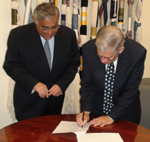|
by Mary Helen Yarborough
Public Relations
The region evoked comparisons to Charleston: warm, friendly and
polished. Beirut, Lebanon also is the home to one of the world’s
leading medical schools at the American University of Beirut (AUB),
which has trained some of the brightest medical students from eastern
Mediterranean countries.
For the past seven years, the best of the top 10 percent of medical
students attending the AUB medical school were selected to participate
in the Medical Scientist Training Program (MSTP) under the umbrella of
MUSC’s College of Graduate Studies (CGS) and College of Medicine. The
program blossomed from seeds planted by CGS Dean Perry Halushka, M.D.,
Ph.D., when he visited AUB in 2002. His visit uncovered a treasure
trove of intellectual talent that could enrich MUSC’s international
student diversity and help return academic physician-scientists to AUB
and Lebanon.
 Dr. Perry Halushka signs the agreement between MUSC and AUB. Dr. Nadim Cortas also signed the agrement. Dr. Perry Halushka signs the agreement between MUSC and AUB. Dr. Nadim Cortas also signed the agrement.
“I
remember walking into his office; and the first time I met Dean Cortas,
I knew it was going to be a positive experience,” said Halushka,
sitting in his office visiting with a special colleague, Nadim Cortas,
M.D., AUB’s vice president for medical affairs and dean of the faculty
of medicine and medical center.
Cortas came to Charleston to participate in graduation ceremonies in
which two of the AUB medical students graduated having fulfilled all
the requirements for the medical and doctoral degrees. These students
completed their pre-medical studies and the first two years of medical
scholl at AUB.
“Our goal has been to build upon the critical mass of intellectual
motivation to grow our research infrastructure and rebuild our MD/PhD
program as AUB medical school has been rebuilt following 20 years of
civil war,” Cortas said. “When Dr. Halushka came to Beirut, he liked
the idea of forming an academic partnership, and things moved fairly
quickly from there.”
On April 1, 2003, an agreement was signed between the two universities
that focused on recruiting the best medical scientists at AUB to MUSC
to become MD/PhDs.
Halushka’s interest in developing a relationship between MUSC and AUB
was based on expanding the intellectual base from a more varied set of
social experiences.
“I believe that by recruiting the best possible medical students with a
desire to conduct research and a diverse background enriches our
training program and the environment in general,” Halushka said.
Halushka visited AUB at the end of April where he signed the agreement
for another five years. He was an invited speaker at the annual Middle
East Medical Assembly that is hosted by AUB’s Faculty of Medicine and
its alumni and attracts 1,300 to 1,500 participants from Lebanon and
the Middle East. He also received the Shield of the Faculty of Medicine
at AUB in appreciation for his leadership and devotion to the AUB-MUSC
MSTP.
Since 2003, AUB has sent seven students to MUSC.
“These AUB students have been so extraordinary that two of the three
graduates were selected as our Distinguished Graduate Student of the
Year,” Halushka noted.
After MUSC, AUB-MUSC-trained medical scientists will intern at some of
America’s top hospitals where they will continue both their medical and
research training.
To enhance MUSC students’ experiences, Halushka said that Cortas has
had discussions with Jeff Wong, M.D., senior associate dean for medical
education, on a program to encourage students to take an elective month
to study at AUB.
“AUB is a very ‘Americanized’ system,” Halushka said. “It isn’t what
people would suspect, considering that it is in the Middle East. In
terms of the quality of education and clinical experience, it’s as good
as many in the United States.” Many of the faculty have trained in the
country's most prestigious universities.
East region, continuously since it was founded in 1867. AUB Faculty of Medicine has graduated more than 4,150 physicians.
Diversity facts
The College of Graduate Studies currently has 57 MSTP students with 6
AUB students, 1 student from Afghanistan, and 7 underrepresented
minorities. MUSC’s nationally-acclaimed and highly competitive MSTP
program has had three underrepresented minority graduates.
About
80 percent of AUB’s fourth-year medical school students spend two to
three months in electives at top medical schools in the USA. AUB also
has agreements with other top medical colleges, including:
- St. Jude Children’s Research Hospital (since 2000)
- Columbia University College of Physicians and Surgeons for student elective exchange (since 2002)
- University of George Washington School of Medicine in Washington, D.C. (since 2004)
Friday, May 29, 2009
|



